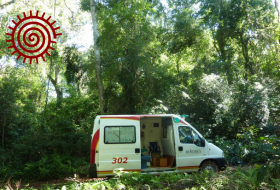Coll de Lima Hutchison is a researcher at the London School of Hygiene and Tropical Medicine (LSHTM, London), currently writing about microbes, their associated human and other hosts, particularly those persons ‘fighting’ against antimicrobial resistance and viral invasions or searching for probiotic salvation. He is also exploring challenges of health governance and socioecological transformation beyond state and market actors. He is a founding member of Kṣobha; a small collective, fermenting ideas to nourish and support possibilities of greater personal, collective, embodied care and more-than-human healing. Andrea Núñez Casal is a researcher at the Department of Science, Technology and Society in the Institute of Philosophy, Spanish National Research Council (IFS-CSIC) and at the Department of Philosophy and Anthropology at the Universidad de Santiago de Compostela (USC), Spain. Herresearch examines the entanglements between microbes, embodiment and inequalities. To date, her research has centred on the socio-cultural aspects of the human microbiome and immunology, and feminist embodied approaches and decolonial methods to address and remedy inequalities associated with AMR and chronic/recurrent infections. Her current multi-sited research studies the relationalities of gender, microbial biodiversity, and local health cultures as key to reveal the transgenerational knowledges-practices and embodied experiences of healing and their subsequent imprint on contemporary biomedicine.
